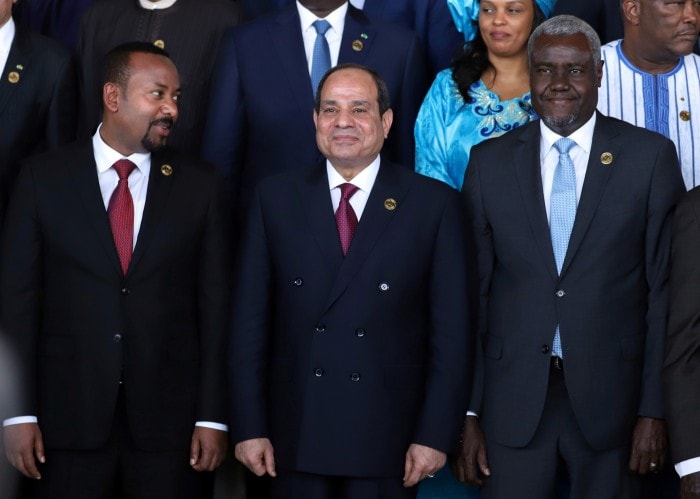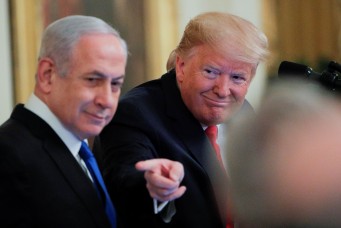Missed Opportunities in Middle Eastern Diplomacy
Former Foreign Minister Nabil Fahmy discusses with renowned scholars the lessons learned from past crises as outlined in his new book to chart a more engaged and multilateral future.

Egyptian President Abdel Fattah el-Sisi poses for a photograph with Ethiopia’s Prime Minister Abiy Ahmed and African Union Commission Chairperson Moussa Faki Mahamat at the opening of the 33rd Ordinary Session of the Assembly of the Heads of State and the Government of the African Union (AU) in Addis Ababa, Ethiopia, February 9, 2020. Tiksa Negeri/Reuters.
“It’s rich in detail, rich in analysis; it’s rich in looking at the past, and it’s also rich in looking at the present and the near future,” Paul Salem, President of the Middle East Institute (MEI), described Egypt’s Diplomacy in War, Peace and Transition, the book recently released by Nabil Fahmy, former Egyptian Foreign Minister, ambassador to Japan and the United States, and Founding Dean of the School of Global Affairs and Public Policy (GAPP) at the American University in Cairo (AUC).
“Anybody who knows anything about Egypt…will tell you that we are umm ad dunya (mother of the world),” Fahmy began. Egypt was once a giant in the regional and world orders; but, in the past fifty years, its prominence has declined. This was the theme of Fahmy’s book, and of a special webinar by the same name co-hosted by GAPP and MEI on June 1. The dialogue brought together major players in the field of Middle Eastern diplomacy: Tarek Masoud, Professor of Public Policy and the Sultan Qaboos bin Said of Oman Professor of International Relations at Harvard University, acted as moderator, and Lisa Anderson, Professor Emerita at Columbia University School of International and Public Affairs and former President of AUC, gave her comments alongside Salem.
Fahmy’s book was intended to fill two gaps: cultural and generational. First, he noted a dearth of Arab voices in English-language discourse on the Middle East. As Anderson later acknowledged, “[the book] fills a gap in the literature that some of us had gotten so accustomed to we forgot it was there.” In addition, Fahmy described feeling propelled by a feeling of responsibility to the younger generation. “My generation came into points of power with the Middle East in a much better state of affairs than it is today,” he said. “I felt that it was important to share my experiences.”
Fahmy’s presentation highlighted the landmark issues of the last sixty years, including the 1967 War, the Iraqi invasion of Kuwait, the U.S. invasion of Iraq, the 2011 Egyptian revolution, and the enduring struggle to negotiate peace between Israel and Palestine. Yet, his remarks focused not on the mechanics of the issues, but on the lessons that can be learned. The U.S. invasion of Iraq, for example, effectively divided the Middle East’s Arabs and non-Arabs and gave the latter a dominant voice, to which Fahmy’s book itself is a remedial effort.
Fahmy wove these experiences into the fabric of “missed opportunities”, drawing from the Arab–Israeli peace negotiations in particular as case studies. One was Syria’s failure to attend the 1973 Geneva Conference shortly after the October war with Israel; this sent the message that, if Egypt wanted to be a main player in negotiations, it would have to do so alone. On the Israeli side, the government of the late Yitzhak Rabin and Shimon Peres in 1995 had a wonderful opportunity to accelerate peace, Fahmy said, but continuing to pursue settlements rendered it moot. Lastly, the potential of the second Camp David summit in 2000 was squandered by American diplomatic mismanagement. The United States did not prepare for the summit nor engage with its participants properly, Fahmy said; indeed, later in the dialogue Fahmy spoke about the ways Egypt should and should not engage with its partners.
Though these events are markedly global, they led Fahmy to draw one cardinal conclusion: that domesticity and diplomacy cannot be separated. “To move to a better future in geopolitics, you need to also work on your domestic situation,” he warned. And, in Egypt, “We haven’t since 1952 been able to reach a social contract that everybody is comfortable with,” Fahmy said. “We have a pluralistic political system, but not yet a pluralistic political culture”—which he defined as tolerance of dissent by the government. Without that, the potential of Egyptian diplomacy is still inchoate.
As a result, the ensuing conversation was underlined by a consensus that Egypt’s position on the world stage is not what it once was. Once Fahmy concluded his opening remarks, the floor (in this case, screen) was given to Anderson for her take. She had high praise for the book itself: “It’s so refreshing to read something by someone who just loves being Egyptian,” she remarked, revealing that Fahmy had struck the delicate balance between being patriotic and sycophant. She continued to contrast Fahmy’s foreign policy posturing in 2013–2014—which she described as “inventive” and “active”—with those of Egyptian governments past and present. “By and large, for several decades Egyptian governments have been very defensive,” she said, offering a decline in assertiveness as one reason for Egypt’s diminished role on the world stage.
Salem echoed praise of Fahmy’s book; in a world where an inside look at the experiences of Arab diplomats is rare, “just writing this is a democratic act”, he said. Continuing the thread of discussion, Salem first observed: “For many generations of the Arab world, Egypt was the future…For a moment in 2011, it stood to regain the momentum of being the future, but quickly lost it again—first in the Islamist iteration, then in the 1952-style authoritarian state.” What advice would Fahmy give to the new generation, he asked, who are now tasked with crafting the future?
Fahmy responded by attributing Egypt’s decline in prominence to two failings: not looking to the future and not sufficiently prioritizing partnerships. He criticized the tendency to bank on prestige of the past, while again drawing attention to the marriage between domesticity and diplomacy. “We got so involved dealing with our own crises that we stopped playing the regional role”, he said. He urged Egyptian policymakers to broaden their view beyond the Arab states—especially in light of the crises in the region—noting that diversifying diplomatic ties will insulate the country from changing interests. In practical terms, what is needed is reeducating foreign service officers, creating ministerial posts for regional affairs, and conducting long-view risk assessments.
After Fahmy gave his recommendations, Masoud turned to the questions posed by the audience. He led with one by Daniel Kurtzer, former U.S. ambassador to Egypt, who asked Fahmy to outline lessons learned specifically from Egyptian diplomatic decisions—such as Egyptian silence on the prospect of Israeli annexation of the West Bank—rather than the regionally-based insights earlier described. Fahmy’s response was simple: “you shouldn’t be overly dependent on anyone,” he said, describing a feature of late President Hosni Mubarak’s rule. On the point of annexation, Fahmy concurred with the statements made by the Egyptian presidency and foreign ministry condemning the move. The Egyptian view has long been that any solution to the Israeli-Palestinian conflict must be grounded in 1967 terms, which directly oppose annexation. When asked why Arab states in general aren’t more vocal about Israel’s intentions, Fahmy’s reasoning was the same that drove his review of Egyptian regional decline: Arab leaders have to put out their own fires. This need to turn inward has merged with exhaustion and desensitization to stymie protest—though decisive response by Arab states now will prevent the region from facing even more intractability post-annexation.
Other viewers asked for Fahmy’s take on the conflict brewing between Egypt, Ethiopia, and Sudan around the Grand Ethiopian Renaissance Dam (GERD).
One webinar viewer described the GERD crisis as “the most abject failure of Egyptian foreign policy over the last fifty years”. In Fahmy’s view, the mistake here is one already described: Egypt failed to look forward and anticipate the interests of its neighbors. He cited GERD as a result of missed opportunities years in the making; after the assassination attempt on Mubarak in June 1995, Egypt withdrew its focus on Africa, but is slowly re-engaging the continent now. “War and peace is about the region,” he ended.
Lastly, Fahmy was asked to reflect on the administrative reforms currently taking place in the Egyptian government. He prescribed a cocktail of decentralization, transparency, and accountability, which must be applied to all sectors to yield successful reforms. However, “what you’re looking at [in Egypt today] is the cumulation of peaks and troughs over the past seventy years,”
It’s going to take time before we can appropriately determine whether change has been made, he cautioned.
Had those peaks been more sustainable, Egypt may still be a leader in the Middle East today, Fahmy suggested. That’s the challenge that the country faces today, and the theme of the ambassador’s remarks through the discussion: learn from the past, but look to the future.
Sydney Wise is contributing editor at the Cairo Review of Global Affairs. Her past work has been published at the Boston Consortium for Arab Region Studies. On Twitter: @sydneyywisee
Read MoreSubscribe to Our Newsletter




